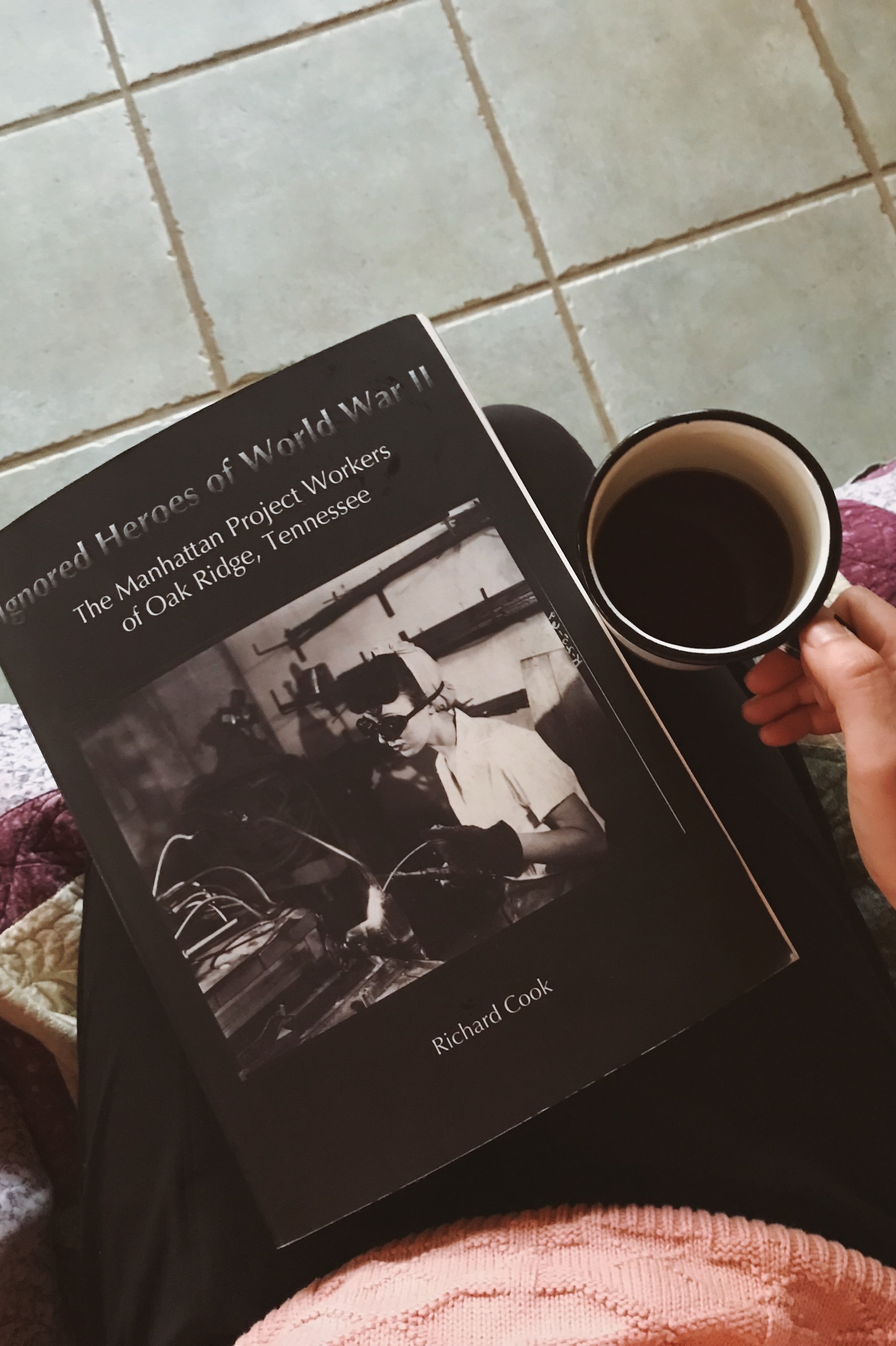The Girls of the Atomic City & My Obsession with Oak Ridge
/Have you heard of Oak Ridge, Tennessee?
If you haven't, here's the short version: During WWII, the US Government needed a place to establish a secure production colony for enriched uranium that would go into what would become the Atomic Bomb. Oak Ridge was created and its purpose was a secret to almost every single soul (of the many, many thousands) that lived there until the first bomb was announced and dropped. Oak Ridge is known as "The Secret City".
I moved to Oak Ridge with my dear Alhen to be close to his family who settled here years ago and after dispersing for some time, have made their way back to a 5-mile radius. Since living here, I've become somewhat obsessed with the local history. Continuing my experiment with eBooks (which are surprisingly great for runs), I listened to Girls of the Atomic City by Denise Kiernan to get the oft-neglected female perspective of WWII and Oak Ridge.
Read by the author, Girls of the Atomic City explores the establishment of Oak Ridge and the daily living experiences of a handful of real women who lived and served during the creation of the city.
Each female perspective is interwoven - some overlap, others stand alone, but all exist in the same, small city that brought an end to the bloodiest conflict in modern time. With so many men away at war, women went to work in Oak Ridge for a multitude of reasons: Killer job offers and pay that wasn't available to women elsewhere, adventure - because who doesn't love a train ticket with a secret destination? and commonly: family opportunity. The women needed to pay for their children's food and education, women of color needed to work while they're men were overseas, families went to serve as civilians if they could not serve in the armed forces. Patriotism was the backbone of society and I don't think we'll ever see it so strong as the mass-exodus of professionals and unskilled laborers alike to Oak Ridge.
Denise Kiernan took great care in getting to know her subjects; she clearly conducted months (maybe years) of careful interviews, deep dives into uncomfortable subjects, and uncovers many secrets in the seemingly-most secretive place in American history. Kiernan's narrative is clear and without fluff - she tells stories of strength and struggles with elegance one can imagine of women living in the circumstances of Oak Ridge's staunch secrecy and delicate working balance.
When we read stories about war, we learn about weapons, battles, generals, and major occurrences. These elements make periodic appearances throughout the book but more prominent are the most important aspects of daily life: the social calendar that was continuously developed to satisfy a population otherwise completely imprisoned; the women's perspective column in the Oak Ridger, written by the female editor of the publication; the drastically different experiences had by caucasian women versus women of color who - though they may have come from the north - were still subject to highly discriminatory treatment, including being segregated in group housing away from their husbands.
It's arguable that Oak Ridge was built by men but made by women. There were dances on the tennis courts, social clubs for every activity under the sun, weekend shopping excursions to Knoxville by the carload, and a very funny anecdote about a woman who convinced a few construction workers to fashion her biscuit pans from some wasted metal. Those biscuits made many residents and guards very, very happy.
Denise's book is a must-read (or listen) for a variety of reasons:
The female effort in WWII has largely limited to Rosie the Riveter as a source of inspiration. However, women were instrumental in creating the end of WWII and lived vibrant but tragically impacted lives during that time period. If anything, this collection of stories within a larger narrative is a testament to the strength and resilience of women.
WWII is much more than D-Day, Pearl Harbor, and the bombing of Hiroshima and Nagasaki. Our nation currently sits on the brink of disastrous conflict and the potential of nuclear warfare. The creators of the original weapon of mass destruction, the Atomic Bomb, had no idea what they were creating and were left with the burden of processing and accepting what they'd been party to. Understanding their struggle and their story has given me a very different perspective on war and international conflict and as a concerned global citizen, it's worth your consideration.
Denise tells the stories of so many real women who lived, loved, and served during that time period with undeniable grace and care. She gives them credit, humanizes them, and brings them to life for all who pick up her book. If nothing else, enjoy Denise's expert storytelling and her commitment to truth. There was no need to dramatize anything that happened during the establishment of Oak Ridge as it was dramatic enough and Denise does this drama justice by telling it like it was.
The Oak Ridge exploration continues with: Ignored Heroes of WWII
Written by local Oak Ridger Richard Cook, this book catalogs the complete history of the 'colony', which started with a single plantation and grew to house over 50,000 individuals. This book is huge - coffee table sized - and is full of photos by the famed photographer Ed Westcott. Westcott's coverage of Oak Ridge is unprecedented. Whoever was in the WWII PR department had their head on correctly when they decided it was necessary to have a full-time live-in photographer for the creation of a militarized weapon-manufacturing supportive compound.
The photos and anecdotes begin with the land secured for the Oak Ridge compound - secured via eminent domain, displacing thousands of farmers and landholders who'd lived there for generations. It goes on to capture the thousands arriving by train, most of whom did not know their destination. There are photos of children playing outside the temporary housing (and by temporary, they meant years with no determinable deadline), photos of dances and sports teams playing, photos from inside the plant where mystery work was happening by hands completely unaware of their impact.
I'm still reading this book, but once I'm finished, I'd be happy to pass it along to another history buff, Oak Ridge newbie, or military enthusiast who would like to enjoy it. It's a masterpiece that's self-published and in rare quantity. Mine also happens to be signed which it pretty cool.


